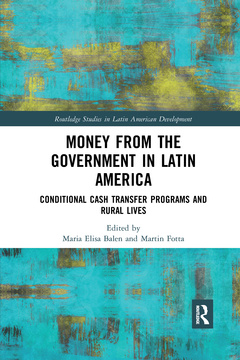Money from the Government in Latin America Conditional Cash Transfer Programs and Rural Lives Routledge Studies in Latin American Development Series
Coordonnateurs : Balen Maria Elisa, Fotta Martin

It has been almost two decades since conditional cash transfer programs first appeared on the agendas of multilateral agencies and politicians. Latin America has often been used as a testing ground for these programs, which consist of transfers of money to subsections of the population upon meeting certain conditions, such as sending their children to school or having them vaccinated. Money from the Government in Latin America takes a comparative view of the effects of this regular transfer of money, which comes with obligations, on rural communities.
Drawing on a variety of data, taken from different disciplinary perspectives, these chapters help to build an understanding of the place of conditional cash transfer programsin rural families and households, in individuals? aspirations and visions, in communities? relationships to urban areas, and in the overall character of these rural societies.
With case studies from Chile, Mexico, Peru, Brazil and Colombia, this book will interest scholars and researchers of Latin American anthropology, sociology, development, economics and politics.
Introduction: Rearticulations of rural lives through conditional cash transfers
Martin Fotta and Maria Elisa Balen
PART I: GLOBAL CCT REPERTOIRES AND THEIR LOCAL TRANSLATIONS
1. Gendering and engendering capital: Conditional cash transfers in indigenous and rural households, Yucatan, Mexico
Andrés Dapuez
2. Filling the belly and feeding the mind? Bolsa Família and the building of children’s human capital in rural Amazonia
Barbara A. Piperata
3. Peruvian mothers contending with conditional aid and its selective inattention to the conditions of rural life
Tara Patricia Cookson
PART II: CCTs ORGANIZING COMMUNITY RELATIONS
4. Fragmented rural communities: The faenas of Prospera at the interface of community cooperation and state dependency
Clément Crucifix and Solène Morvant-Roux
5. Empowering women? Conditional cash transfers in Mexico
Birgit Schmook, Nora Haenn, Claudia Radel and Santana Navarro-Olmedo
6. Money from above: Cash transfers, moral desert and enfranchisement among Guaraní households of the Argentine Chaco
Agustin Diz
7. Dangerous desires: The affects (and affections) of cash transfer programs among the Kalapalo from the Aiha village (Upper Xingu, Mato Grosso, Brazil)
Marina Pereira Novo
PART III: ENVISIONING FUTURES THROUGH CCTs
8. From surprise to anticipation: Money, state and the future of social protection among displaced peasants in El Carmen de Bolívar, Colombia
Maria Elisa Balen
9. Beyond cash, beyond conditional: Ingreso Ético Familiarand the senses of povertyin a group of Mapuche women
Marjorie Murray and Gabriela Cabaña
10. Saying no: Bolsa Família, self-employment, and the rejection of jobs in northeastern Brazil
Gregory Duff Morton
Afterword: From affirmative to transformative distributive politics
Jonathan DeVore
Maria Elisa Balen is Associate Researcher at the Grupo de Protección Social in the Universidad Nacional de Colombia’s Centro de Investigaciones para el Desarrollo, Colombia.
Martin Fotta is a postdoctoral researcher at the Department of Social and Cultural Anthropology of Goethe University Frankfurt, Germany.
Date de parution : 09-2021
15.6x23.4 cm
Date de parution : 11-2018
15.6x23.4 cm
Thème de Money from the Government in Latin America :
Mots-clés :
Conditional Cash Transfer Programs; CCTs; Colombia; Cash Transfers; Mexico; Young Men; Peru; Cash Transfer Programs; Brazil; North American Free Trade Agreement; Chile; Mexico’s Conditional Cash Transfer; Children’s Hunger; Conditional Cash Transfers; Partido Dos Trabalhadores; poverty; MST Leader; international development; Chilean Pesos; Latin America; CCT Policy; rural development; Incidental Strand; World Bank; Mapuche Women; economic development; Southern Bahia; anthropology; Mother Leaders; social policy; Rural Mapuche; Martin Fotta; Oportunidades Program; Andrés Dapuez; Moral Desert; Barbara A; Piperata; CCT Intervention; Tara Patricia Cookson; IMSS; Clément Crucifix; IMF Working Paper; Solène Morvant-Roux; Children’s Diets; Birgit Schmook; Chile Solidario; Nora Haenn; Independent Livelihood; Claudia Radel; Santana Navarro-Olmedo; Agustin Diz; Marina Pereira Novo; Marjorie Murray; Gabriela Cabaña; Gregory Duff Morton; Jonathan DeVore
